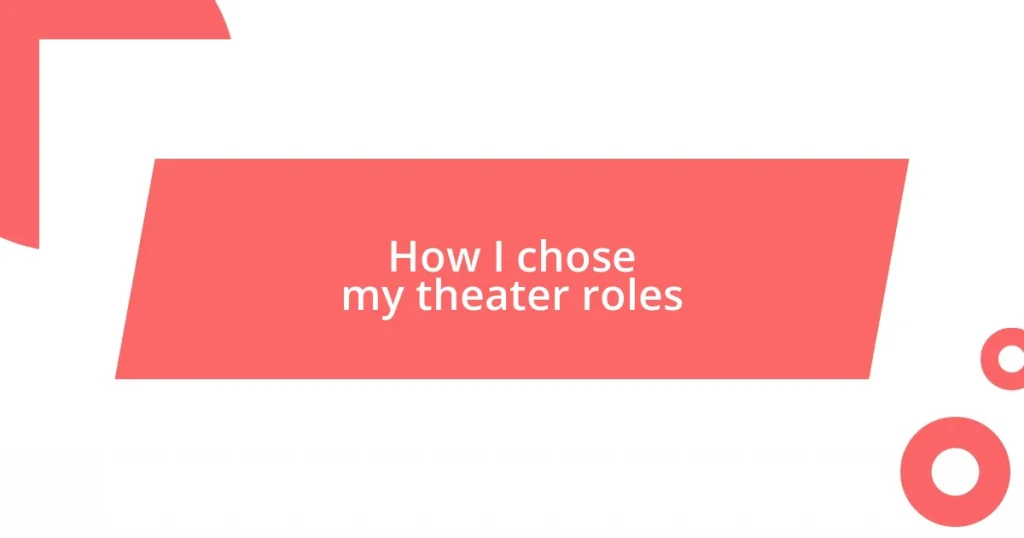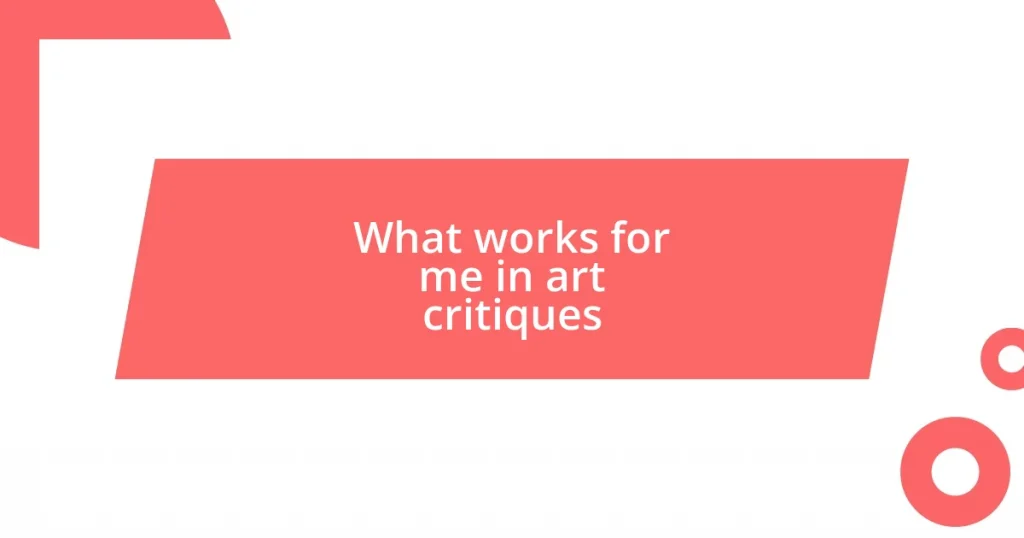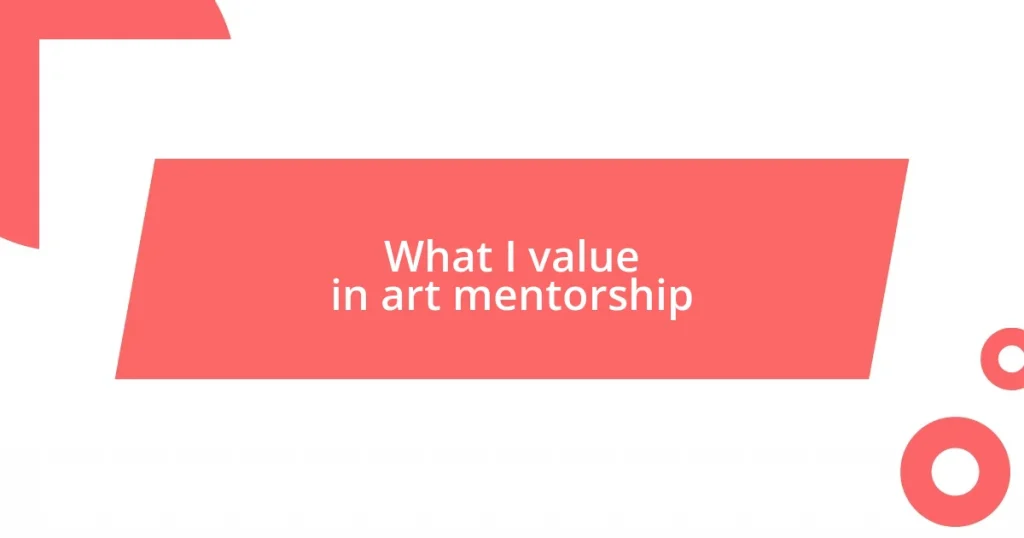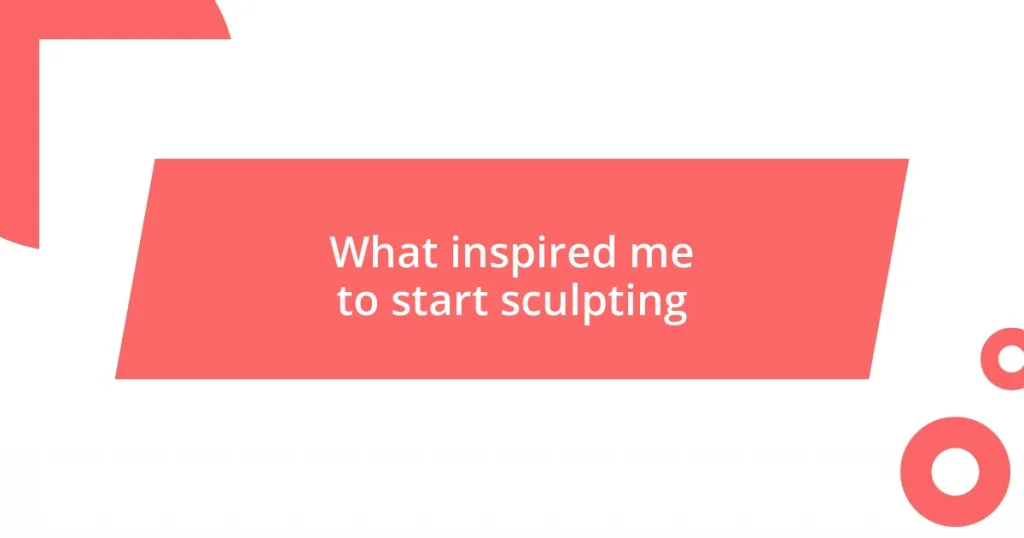Key takeaways:
- Theater roles serve as reflections of personal growth, requiring deep emotional exploration and self-discovery.
- Identifying strengths and weaknesses is vital for an actor’s development, guiding informed choices in role selection and preparation.
- Final role decisions balance emotional connection, the challenges presented, and alignment with the production’s overall vision, enhancing collaborative storytelling.
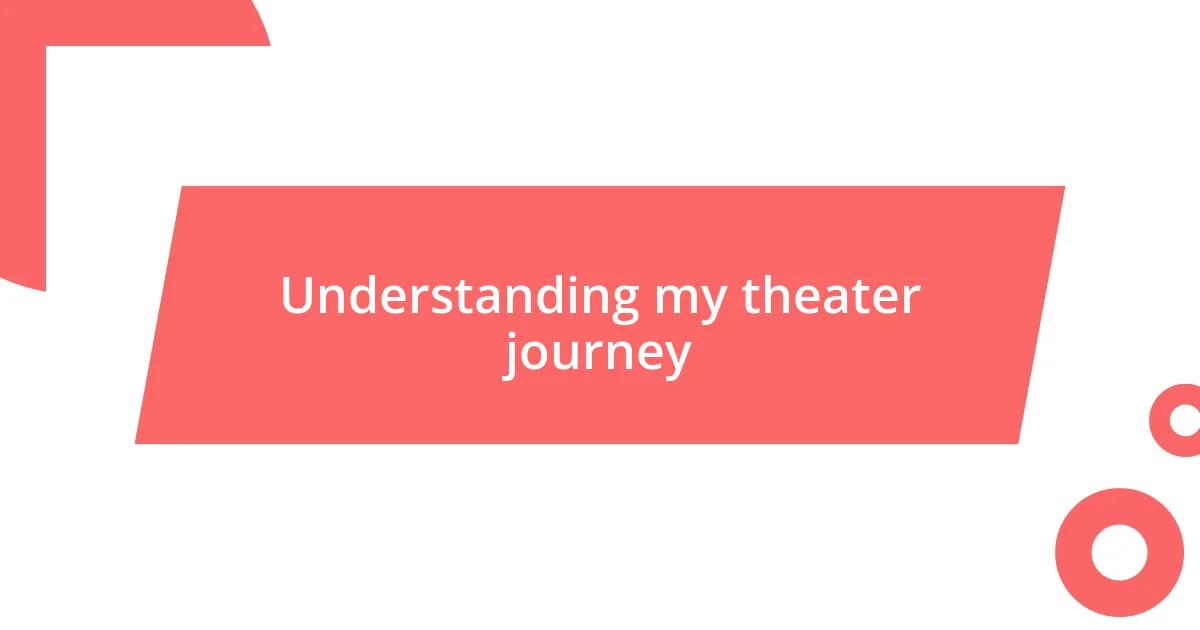
Understanding my theater journey
Theater has been a profound part of my life since childhood. I remember the rush I felt stepping onto the stage for the first time during a school play. It wasn’t just about performing; it was about the electric connection with the audience that ignited my passion for acting.
As I navigated through different roles, I began to question what each character taught me about myself and the world. Have you ever considered how a single role can resonate deeply, revealing hidden aspects of your personality? For instance, playing an antagonist challenged me to explore the darker sides of human nature—something I never imagined I’d connect with on such an emotional level.
Looking back, each role I took on was a stepping stone, shaping my understanding of storytelling and empathy. I sometimes wonder, were these characters reflecting pieces of my own journey, or were they simply smudged mirrors of society? In one memorable production, I learned to channel my own insecurities into a portrayal that was both raw and relatable, illustrating how deeply intertwined our lives can be with the roles we choose.
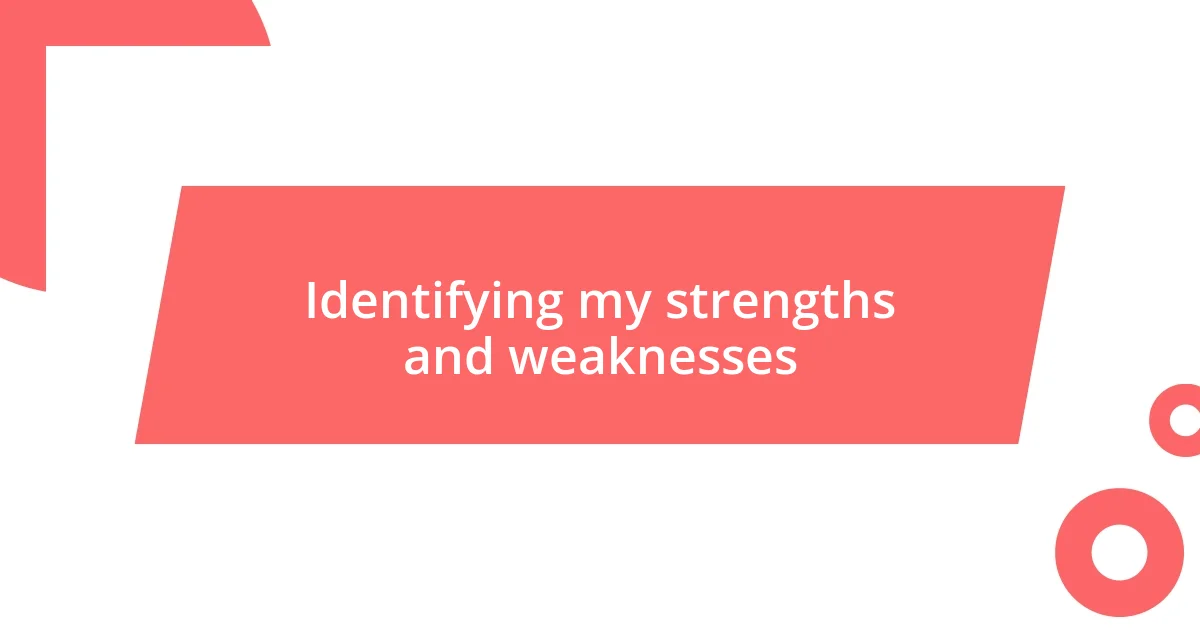
Identifying my strengths and weaknesses
Identifying my strengths and weaknesses hasn’t always been an easy process, but it’s essential for growth. When I took on the role of a romantic lead, I discovered that my ability to convey vulnerability was one of my greatest strengths. However, I realized that my range in comedic timing often fell short. Reflecting on these experiences helped me understand how vital it is to embrace both my capabilities and areas for improvement.
To further clarify my strengths and weaknesses, I often jot down my personal insights after each audition or performance. This habit has led to some enlightening revelations:
-
Strengths:
- Emotional depth in dramatic roles
- Strong physicality and stage presence
- Natural ability to connect with the audience
-
Weaknesses:
- Nuances of comedic roles
- Spontaneity in improvisation
- Unfamiliarity with certain dialects
By confronting these facets of my artistic self, I’ve been able to make more informed choices in the roles I pursue. Each critique becomes a stepping stone toward the next audition, guiding me toward characters that truly resonate with my evolving identity as an actor.
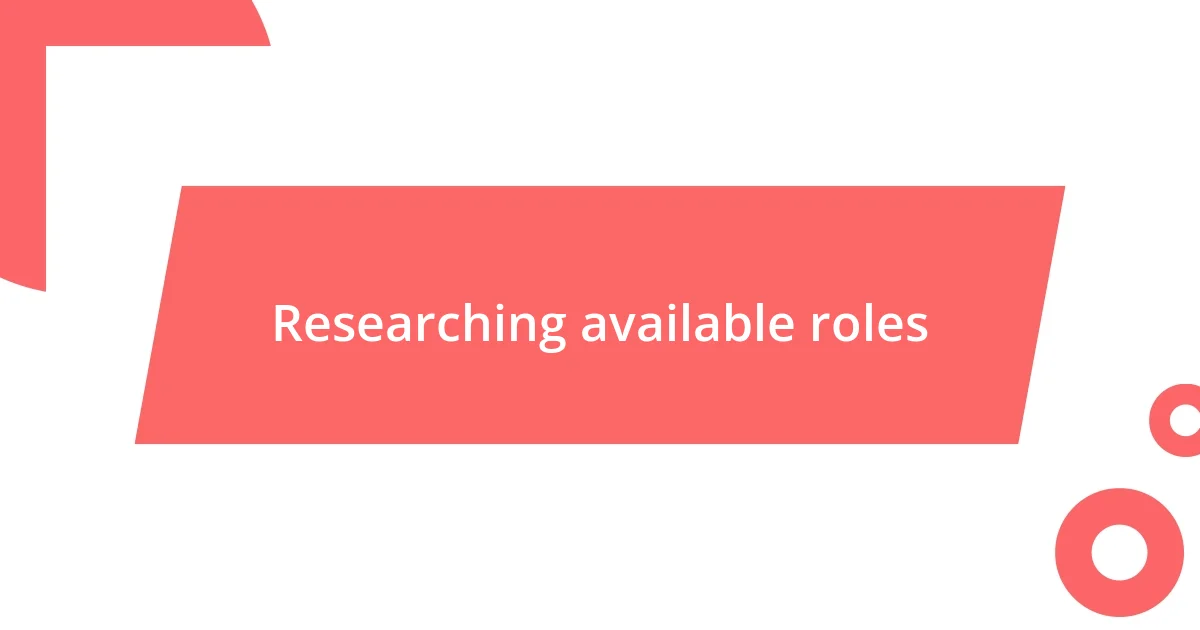
Researching available roles
Researching available roles is a pivotal aspect of my acting journey. I often find myself scouring theater listings, online platforms, and community boards. It sometimes feels like a treasure hunt—exciting yet overwhelming. I remember one evening, sitting at my kitchen table, absorbed in a sea of auditions. I stumbled across a call for a Shakespearean character I never thought I could play. Exploring diverse sources not only opens doors but also expands my understanding of different genres and styles.
As I dig deeper into each role, I ensure I grasp the essence of the character. I like to watch past performances and read reviews to get a feel for how others interpreted similar roles. This process evokes mixed feelings—anticipation mingled with self-doubt. I still recall watching a video of a stunning performance of Lady Macbeth; the intensity gripped me, igniting a desire to sink my teeth into such a dynamic character. The more I immerse myself, the clearer my passion becomes. What really drives me to pursue a role? It’s the thrill of bringing a character to life and exploring the breadth of human experience.
I also turn to conversations with fellow actors and directors for insights. Their perspectives can illuminate potential pitfalls or hidden gems within a role. I often ask myself, “Could I envision myself embodying this character?” A friendly chat once revealed to me the intricacies of a role that initially seemed straightforward, completely reshaping my view. This collaborative exploration enriches not just my knowledge but also my emotional resonance with the characters I choose.
| Source | Details |
|---|---|
| Theater listings | Local and regional opportunities |
| Online Platforms | Virtual auditions and wider casting calls |
| Community Boards | Grassroots theater and volunteer roles |
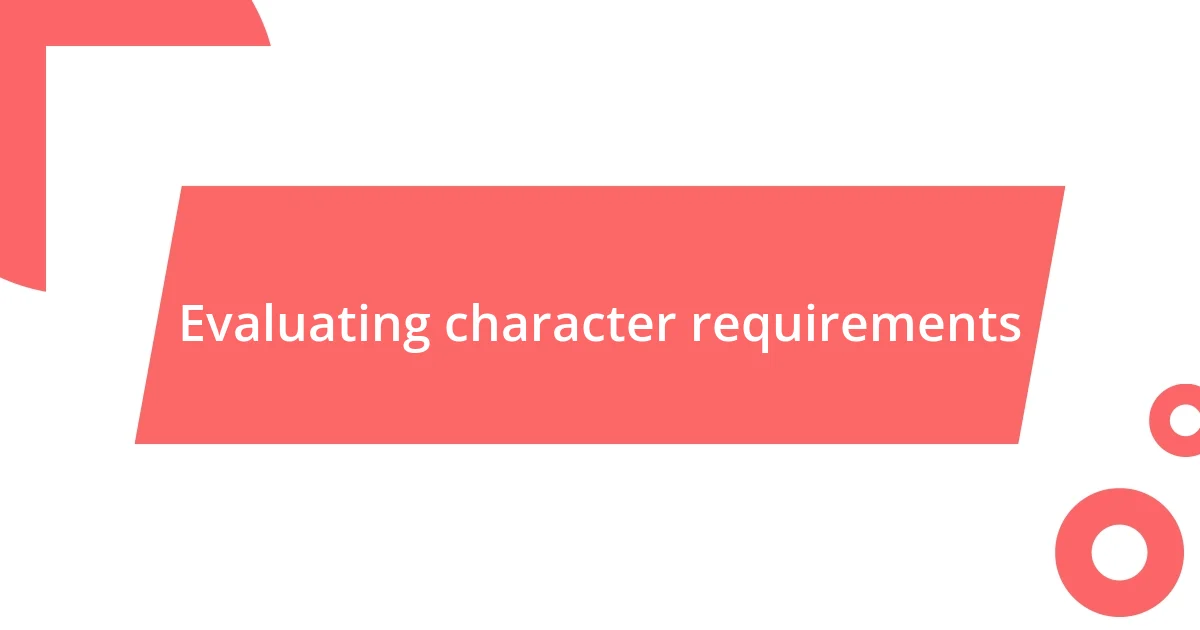
Evaluating character requirements
Evaluating character requirements is a crucial step that I never take lightly. When faced with a new role, I always start by analyzing the character’s backstory, motivations, and relationships. Recently, I auditioned for a quirky yet troubled artist, and digging into her complex emotional landscape was both challenging and exhilarating. I asked myself, “Could I truly understand her pain and fervor?” This introspection helped me gauge my ability to deliver authenticity to the role.
As I explore the specifics, I pay close attention to the character’s physical and vocal traits. In one instance, I was cast as an older mentor, and embodying her posture and speech patterns required extensive practice. The way she moved and spoke carried emotional weight that needed to resonate on stage. It made me realize how critical it is to not just act, but to embody these traits fully. Have you ever thought about how subtle changes in mannerisms can dramatically shift your interpretation of a role?
Tone and energy play pivotal roles in capturing the essence of a character as well. I distinctly remember rehearsing for a high-energy comedic part; I had to channel a lively spirit that pushed me well outside my comfort zone. I found myself dancing around my room, laughing and letting loose, which truly helped me connect with the character. It taught me the importance of evaluating the emotional range I can bring to the table, not just in dramatic pieces but in lighter, more cheerful performances as well. Finding that balance can transform how I approach any future role.
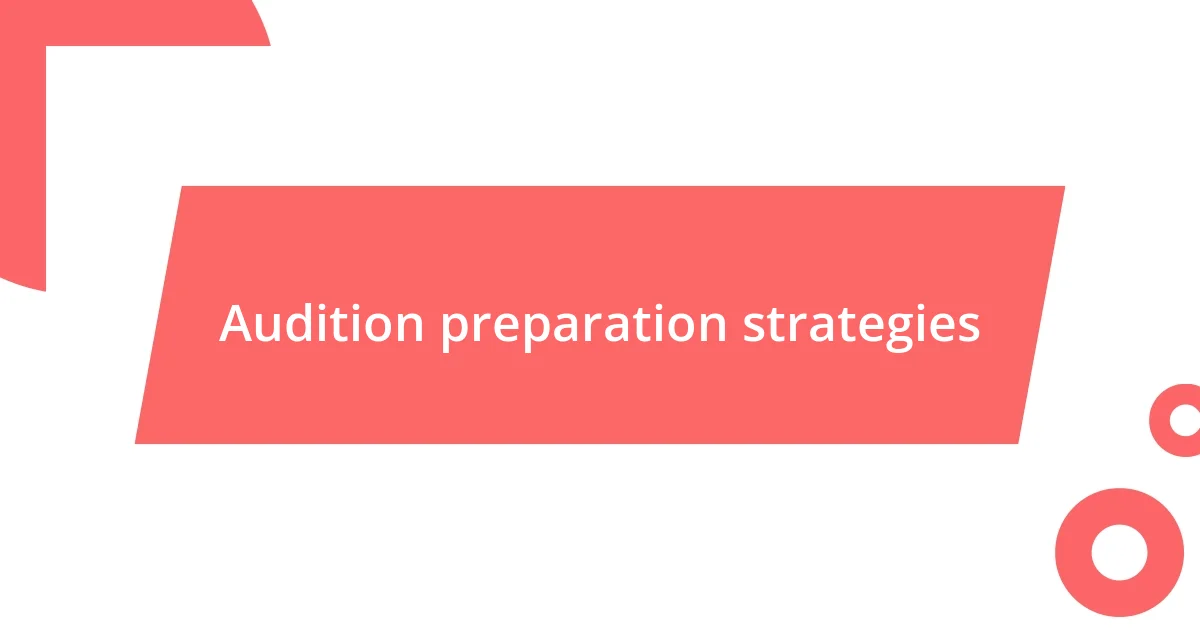
Audition preparation strategies
When preparing for an audition, I believe that crafting a unique approach to each piece is vital. My strategy often includes breaking down the script to uncover layers of meaning. I once found an old script and, after a thorough read, realized there was a nuanced rivalry between characters that I hadn’t initially perceived. It brought a whole new depth to my performance. Have you ever discovered hidden motivations that changed how you viewed a character? This kind of analytical thinking helps me connect with the role on a much deeper level.
I also dedicate time to practice through improvisation and character exploration. One memorable session was when I transformed my living room into a rehearsal space, embodying the eccentricities of a role that defied my usual persona. I remember laughing at myself as I bounced off the walls, embodying the quirky energy of the character. It’s liberating to shake off the constraints of daily life and just be—have you ever let go like that? It’s during these moments that breakthroughs often happen, allowing me to truly inhabit the character’s spirit.
A vital part of my audition preparation is receiving feedback from trusted peers. A supportive fellow actor once urged me to adjust my delivery of a monologue, suggesting a more vulnerable approach. The resulting transformation not only impressed the casting team but deepened my understanding of the character’s emotional arc. This phase of preparation reminds me that collaboration can illuminate our blind spots. Engaging with others in the process not only enhances the performance but also builds a sense of community that enriches the overall journey.
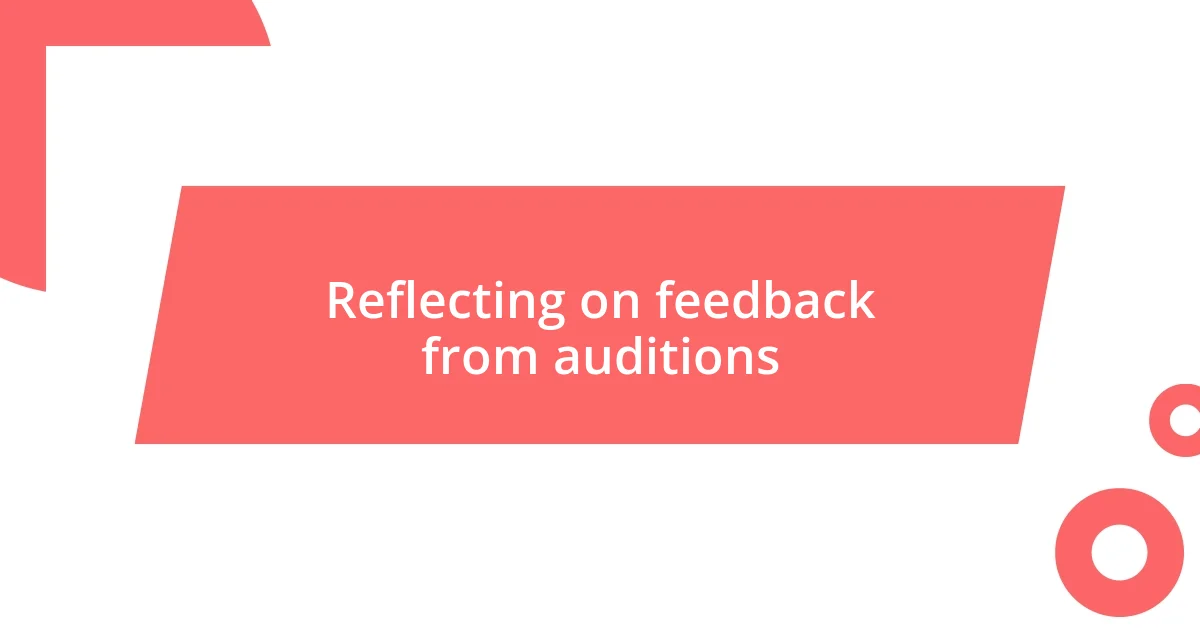
Reflecting on feedback from auditions
When reflecting on feedback from auditions, I find that it’s a blend of acceptance and growth. Last summer, I faced a tough critique after a performance that didn’t land as I had hoped. One director pointed out that my emotional depth felt surface-level. Initially, I felt defensive, but as I mulled it over, I realized he was right. Have you ever thought about how critical feedback can shine a light on blind spots we didn’t even know existed?
One of the most transformative moments in my journey happened after an intense audition for a dramatic role. I had poured my heart into the performance, but the feedback highlighted a disconnect between my portrayal and the character’s underlying pain. Instead of feeling disheartened, I considered the feedback a gift. It allowed me to dive deeper into my emotional toolbox. Isn’t it fascinating how sometimes the path to authenticity isn’t a straight line, but rather a winding road filled with lessons?
Moreover, I’ve learned to reframe feedback as the beginning of a dialogue rather than a definitive judgment. For instance, after attempting a role I was passionate about, a mentor pointed out my tendency to overact in emotional scenes. Rather than seeing this as a setback, it sparked an exploration of subtler choices in my next audition. This shift in perspective has transformed criticism into a collaborative experience—one that draws me closer to my true self as an artist. Isn’t it liberating to think that every piece of feedback is an invitation to evolve?
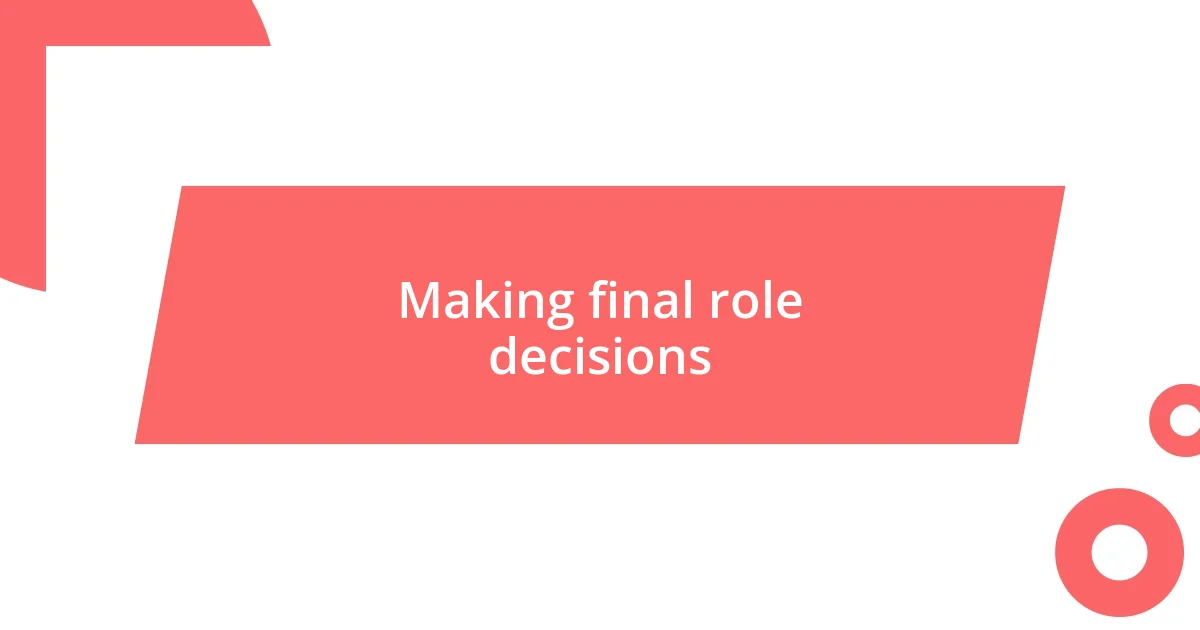
Making final role decisions
When it comes time to make a final decision on a role, I often find myself weighing my emotional connection to the character against the challenges the role presents. I once faced a choice between a comedic part that seemed easy to embody and a dramatic one that terrified me. Ultimately, I chose the drama, realizing that pushing my limits would lead to personal growth. Have you ever picked a challenge over comfort? It can be daunting, but it often leads to the most rewarding experiences.
Another key factor for me is the overall context of the production. I remember auditioning for a play where the director had a vision that resonated deeply with my own values about storytelling. This alignment made me feel not just like a performer, but part of a collective journey. It’s powerful to know that every performance contributes to a greater narrative, isn’t it? I believe that selecting a role shouldn’t just be about individual spotlight but also about the greater artistic collaboration.
Finally, I seek advice from my instincts and trusted mentors. On one occasion, after deliberating for days over a role that challenged my comfort zone, my acting coach reminded me to trust in the journey each character offers. That encouragement led me to take the leap, and the experience turned out to be one of the highlights of my career. How often do we let fear guide our choices instead of curiosity? Sometimes, it takes a nudge from a mentor—or a glimpse into our own passion—to embrace roles that ultimately transform us.










